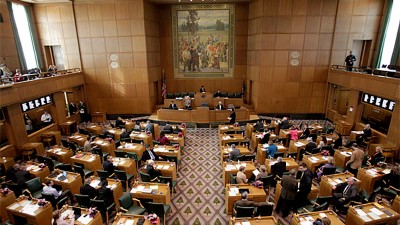As the fallout from COVID-19 begins to impact nearly all aspects of life in the United States, political leaders at the local, state, and federal levels are all grappling with how best to preserve public health and mitigate economic and other damage related to the virus.
Members of Congress are working now on a bill that is expected to include added unemployment benefits, free virus testing, food assistance, tax credits for businesses, and additional funds for Medicaid.
One sticking point in the negotiations: paid family and medical leave. Democrats reportedly want paid leave for those who are ill or caring for ill family members, while Republicans believe that offering the benefit too broadly will result in workers taking advantage of the benefit, impeding economic recovery.
National Efforts to Ensure Support for Children and Families
On Wednesday, a coalition of 39 early childhood advocates jointly sent a letter to Congress urging support for early care and education programming as legislators develop a stimulus package to address the impact of COVID-19. The authors call for “significant and flexible” emergency funding to address the growing public health and economic crisis.
The letter reads in part, “Child care is the backbone of our nation’s economy; without it, millions of parents cannot go to work or attend school, and the U.S. economy suffers billions of dollars in losses. The spread of COVID-19 threatens this system on multiple fronts, as nearly 2 million early childhood educators are trying to effectively and safely care for and educate children, meet the needs of families, protect staff, and cover all of the expenses required to keep their doors open. Child care programs in every state already operate on razor thin margins and teeter on the edge of financial health.”
Asked to comment, Oregon Rep. Earl Blumenauer shared in a statement that he supports efforts to include child care in any stimulus package under consideration and is working in the house to ensure that families will be supported.
“It is necessary to support our nutrition programs and ensure protections for working families, especially in the face of school closures. I am very grateful for the efforts of all early childhood organizations, those on the front lines and those like Children’s Institute, who are advocating and raising necessary funds to keep our children safe and healthy in Oregon.”
At the State Level
The Ounce of Prevention Fund has also issued COVID-19 guidance to state legislators related to the needs of early care and education providers, and other family self-sufficiency programs.
Among the recommendations are a request to temporarily suspend family eligibility requirements for supports like the Supplemental Nutrition Assistance Program (SNAP) and Temporary Assistance to Needy Families (TANF), so that workforce participation, earnings and other factors that may be impacted by COVID-19 are not barriers to eligibility.
The guidance suggests that state funding be offered to support members of the childhood education workforce who are unable to work due to illness or the need to care for someone who is ill. It requests emergency grants for programs to cover potential increases in substitute costs, extended sick leave for staff, or additional sanitation needs in facilities. It also asks for reductions in unnecessary and burdensome paperwork and for flexibility in reporting and grant requirements.
In Oregon
Oregon’s Early Learning Division (ELD) on Friday announced that it would be extending the deadline on applications for Early Learning Funding from the Student Success Act to Monday, May 4, given the extraordinary circumstances created by the COVID-19 outbreak.
It also clarified that child care centers would not be required to close. In a press release issued late Friday, Early Learning System Director, Miriam Calderon said, “Child care is a critical support for working families, their children, and businesses. We know that child care programs will experience similar operational issues to K-12 schools and we should anticipate that closures will happen. As long as families are working, we will support child care businesses to stay open.”
The ELD says it will be working to make exceptions and offer flexibility to existing rules that do not compromise child health and safety. It will also seek federal waivers to expand assistance for families and providers.

